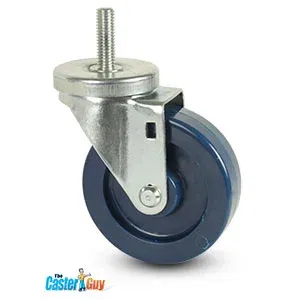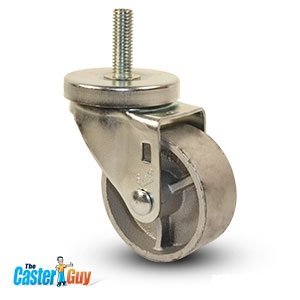 When it comes to choosing the right casters for your needs, the options can be overwhelming. One common question that arises is whether rubber casters are better than other types of casters. In this guide, we’ll explore the benefits and drawbacks of rubber casters to help you make an informed decision for your application.
When it comes to choosing the right casters for your needs, the options can be overwhelming. One common question that arises is whether rubber casters are better than other types of casters. In this guide, we’ll explore the benefits and drawbacks of rubber casters to help you make an informed decision for your application.
What Are Rubber Casters?
Rubber casters are a type of wheel made from rubber, which can be either natural or synthetic. These casters are mounted onto a frame, allowing them to swivel and roll smoothly. They are commonly used in various industries and settings, including medical facilities, warehouses, and office environments.
Advantages of Rubber Casters
1. Floor Protection
One of the most significant advantages of rubber casters is their ability to protect flooring. Rubber wheels are softer than metal or plastic wheels, reducing the risk of scratching or damaging floors. This makes them ideal for use on hardwood, tile, and other delicate surfaces.
2. Noise Reduction
Rubber casters are much quieter than other types of casters. The softness of the rubber helps absorb sound, making them an excellent choice for environments where noise reduction is important, such as hospitals, libraries, and offices.
3. Traction and Grip
The rubber material provides excellent traction and grip, which is particularly useful in environments where spills or slick surfaces are common. This feature helps prevent slippage and enhances safety for both personnel and equipment.
4. Shock Absorption
Rubber casters offer superior shock absorption compared to metal or hard plastic wheels. This makes them ideal for transporting delicate or fragile items, as they can help protect against damage from bumps and vibrations.
Disadvantages of Rubber Casters
1. Load Capacity
While rubber casters have many advantages, they typically have a lower load capacity compared to metal or polyurethane casters. This can be a drawback if you need to move heavy equipment or machinery regularly.
2. Wear and Tear
Rubber casters can wear down more quickly than harder materials, especially when used on rough or uneven surfaces. Over time, this can lead to a need for more frequent replacements, which can increase maintenance costs.
3. Chemical Sensitivity
Rubber casters can be sensitive to certain chemicals, oils, and solvents. Exposure to these substances can cause the rubber to deteriorate, reducing the lifespan of the casters. If your environment involves exposure to such chemicals, it’s essential to choose a more resistant material.
Applications of Rubber Casters
Rubber casters are versatile and can be used in a variety of settings. Here are some common applications:
- Medical Facilities: The quiet operation and floor protection make rubber casters ideal for hospitals and clinics.
- Office Environments: The noise reduction and smooth rolling make them perfect for office chairs and carts.
- Warehouses: Rubber casters can help protect floors and reduce noise in busy warehouse settings.
- Retail Stores: The traction and floor protection are beneficial for moving displays and equipment in retail environments.
Comparing Rubber Casters to Other Types

Polyurethane Caster
Rubber vs. Polyurethane Casters
Polyurethane casters offer higher load capacities and better resistance to wear and chemicals compared to rubber casters. However, they do not provide the same level of floor protection and noise reduction as rubber casters. Choosing between the two will depend on your specific needs and environment.

Steel Caster
Rubber vs. Metal Casters
Metal casters are extremely durable and can handle very heavy loads. They are also resistant to wear and tear. However, they can be noisy and may damage flooring. Rubber casters, on the other hand, are quieter and gentler on floors but cannot support as much weight.
Making the Right Choice
When deciding whether rubber casters are the best choice for your application, consider the following factors:
- Flooring Type: If you have delicate flooring, rubber casters are a better option due to their floor protection capabilities.
- Noise Level: For environments where noise reduction is important, rubber casters are preferable.
- Load Requirements: If you need to move heavy loads, you might want to consider casters with higher load capacities, such as polyurethane or metal casters.
- Exposure to Chemicals: If your environment involves exposure to chemicals, rubber casters may not be the best choice.
Conclusion
Rubber casters offer many benefits, including floor protection, noise reduction, traction, and shock absorption. However, they may not be suitable for all applications, especially those involving heavy loads or exposure to harsh chemicals. By considering your specific needs and environment, you can determine whether rubber casters are the best option for you.
At The Caster Guy, we offer a wide range of casters to meet various requirements. If you need assistance in selecting the right casters for your application, feel free to contact our expert team for personalized advice.

